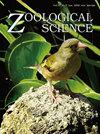伊豆-小笠原弧海底火山Omuro Dashi的一种蛙类Lamellibrachia satsuma的发现及其遗传特征
IF 1
4区 生物学
Q3 ZOOLOGY
引用次数: 1
摘要
在伊豆-小笠原岛弧海底火山大室大石火山口195 m深处的热液区发现了Vestimentiferan管蠕虫(环节动物:Siboglinidae)。根据2022年取样个体线粒体细胞色素c氧化酶亚基I (COI)基因的核苷酸序列,鉴定为Lamellibrachia satsuma Miura, Tsukahara & Hashimoto, 1997。基于14个微卫星标记的结构分析和主成分判别分析(DAPC)表明,大室大石种群与鹿儿岛湾和北马里亚纳弧(日光海山和大国海山)的遗传偏差较大,而大室大石种群与日光海山的COI基因遗传偏差不显著。所有分析结果表明,1994年收集的南开海槽金苏-西北岸甲烷渗漏区个体与大室大石的亲缘关系比与其他生境的亲缘关系更密切。这些结果表明,大室大石种群和南开海槽种群的祖先起源于北马里亚纳弧的移民,南开海槽周围可能存在未被发现的萨摩腊种群。本文章由计算机程序翻译,如有差异,请以英文原文为准。
Discovery and Genetic Characterization of a Vestimentiferan, Lamellibrachia satsuma, from the Submarine Volcano Omuro Dashi in the Izu-Ogasawara Arc
Vestimentiferan tube worms (Annelida: Siboglinidae) were discovered in a hydrothermal field at a depth of 195 m in the crater of the submarine volcano Omuro Dashi in the Izu-Ogasawara Arc. Based on the nucleotide sequences of the mitochondrial cytochrome c oxidase subunit I (COI) gene in individuals sampled in 2022, they were identified as Lamellibrachia satsuma Miura, Tsukahara & Hashimoto, 1997. STRUCTURE analysis and discriminant analysis of principal components (DAPC) based on 14 microsatellite markers showed a large genetic deviation of the population of Omuro Dashi from those of Kagoshima Bay and the north Mariana Arc (the Nikko and Daikoku Seamounts), whereas the population of Omuro Dashi did not show significant genetic deviation from that of the Nikko Seamount based on the COI gene. All analyses showed that individuals of a methane seep area on the Kanasu-No-Se Bank, the Nankai Trough, which were collected only in 1994, were more closely related to those of Omuro Dashi than to those of other habitats. These results suggest that the ancestors of the Omuro Dashi and Nankai Trough populations originated from migrants from the north Mariana Arc and that there might be undiscovered source population(s) of L. satsuma around the Nankai Trough.
求助全文
通过发布文献求助,成功后即可免费获取论文全文。
去求助
来源期刊

Zoological Science
生物-动物学
CiteScore
1.70
自引率
11.10%
发文量
59
审稿时长
1 months
期刊介绍:
Zoological Science is published by the Zoological Society of Japan and devoted to publication of original articles, reviews and editorials that cover the broad field of zoology. The journal was founded in 1984 as a result of the consolidation of Zoological Magazine (1888–1983) and Annotationes Zoologicae Japonenses (1897–1983), the former official journals of the Zoological Society of Japan. Each annual volume consists of six regular issues, one every two months.
 求助内容:
求助内容: 应助结果提醒方式:
应助结果提醒方式:


